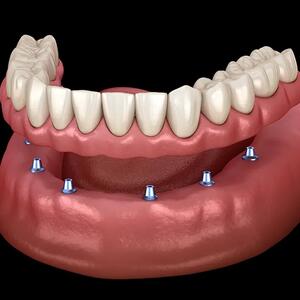What To Do If You Periodically Have A Toothache - Temporary or Chronic
Seeking relief from a toothache? Dental Portal offers expert advice and tested methods. We'll explain how to ease the pain and when it's essential to seek medical help.
What is a Toothache?

A toothache is a symptom of dental issues such as cavities, gum diseases, infections, or injuries. It causes discomfort in or around a tooth. The pain can vary from mild to severe and be either constant or intermittent. Typically, a toothache is sharp, throbbing, or dull. It can worsen with biting or applying pressure. Often, it is accompanied by increased sensitivity to hot or cold. The pain may extend to the jaw, cheek, or ear, depending on its location and severity.
Address a toothache immediately as it can significantly impact sleep quality and concentration. Consult a dentist at the first signs of discomfort.
Causes of Throbbing or a Sharp Toothache
Various inflammatory and pus-filled processes in the teeth and surrounding tissues can cause pain, throbbing, or aching sensations.
- Cavities: Decay of the enamel (the protective layer of the tooth). Initially, cavities are symptom-free. However, as the enamel layer thins, sensitivity to cold/hot increases. If the dentin (near the pulp) is involved, the pain's strength and intensity multiply.
- Pulpitis: Decay reaches the pulp, filled with nerve endings and blood vessels. This causes intense throbbing pain, especially at night. It's challenging to pinpoint the source of pain as it can affect multiple adjacent teeth.
- Periodontitis: Inflammation of the tissues holding the tooth in its socket. A pus-filled process develops at the root tip, leading to cysts or granulomas if untreated. Identified by gum swelling and pain when tapping/biting.
- Gingivitis: Disease of the mucous membrane, involving the resorption of soft and bone tissues. Mostly accompanied by aching pain (occasionally sharp).
- Other Causes of a Toothache
- Incorrectly fitted fillings, crowns, bridges: Pain due to overhanging edges and improper chewing load.
- Improper growth of wisdom teeth: As they emerge, they press on adjacent teeth, causing constant aching.
- Abscess, phlegmon, periostitis (gum boil), osteomyelitis: Accompanied by fever, weakness, cheek swelling.
- Chips, cracks, wedge-shaped defects, exposed tooth necks: Lead to increased sensitivity - hyperesthesia.
- Granulomas, cysts: Dull, aching pain, intensifying at night. Felt at the tooth root, deep in the jaw.
- Bruise, dislocation, root fracture: Constant, moderate pain, worsening with pressure.
Is Pain After Dental Procedures Normal?
Dentists indicate that discomfort, pain during biting, swelling, or slight bleeding may follow procedures such as root canal treatment, fillings, crowns, or implants. These symptoms usually persist for 3-6 days. It’s a typical bodily reaction to the intervention (especially surgeries). If the pain or other symptoms do not subside but instead intensify, seek advice from your dentist.
How to Ease Toothache in 5 Minutes?
When suffering from a toothache, you can try several things:
- Brush your teeth to eliminate food residues.
- Rinse your mouth with an antiseptic solution, baking soda, and salt with two drops of iodine.
- Apply a cold pack to your cheek.
- Make herbal decoctions from oak bark, sage, chamomile – effective if gum inflammation is the cause of the toothache.
- Take a single dose of a pain reliever (after doctor's consultation).
These steps won't cure the issue but serve as emergency methods to soothe acute, throbbing tooth pain.
How to Soothe a Toothache and Is It Tolerable?
There are three ways to quickly alleviate severe toothache before a dental appointment:
- Traditional remedies (decoctions, compresses, mouthwashes - used when no pharmacy is nearby).
- Non-steroidal anti-inflammatory drugs (NSAIDs - most effective).
- Dental drops (beneficial if there’s a cavity suitable for a cotton ball soaked in the solution).
Even if a toothache is quickly subdued, postponing a dentist appointment is not recommended. The onset of increased sensitivity or transient sharp/throbbing pain suggests inflammation. Neglecting it for 2-3 weeks or more reduces the chance of saving the tooth without root canal treatment with each passing day. Failing to seek treatment for over six months could lead to the loss of a tooth.
When to Urgently Visit a Dentist
- Fever exceeds 38℃ (100.4℉).
- If a toothache cannot be alleviated with NSAIDs or drops (at home).
- Emergence of any of these symptoms: a pus-filled blister on the mucosa, intense cheek swelling, continuous bad breath.
In such instances, it's best to consult a dentist immediately. Aim for a 24-hour dental clinic, even during the night. The dentist won't provide a complete treatment but will take immediate actions to reduce severe pain.
For instance:
- In the case of pulpitis, the dentist will gently open the cavity of the affected tooth to apply a devitalizing substance or remove the nerve within 10-15 minutes. This action almost instantly eases throbbing or sharp pain.
- In periodontitis, the tooth cavity will be opened, and pus drainage performed within 10-15 minutes.
Subsequent treatment will proceed in a structured manner, depending on the clinical situation.
Why is Immediate Action Necessary?
Neglecting to address inflammation at its early stages can result in grave complications. For example, untreated pus formations can dissolve gum tissue and reach the jawbone, leading to an abscess that eventually progresses to sepsis. This final complication is particularly hazardous as the infection enters the bloodstream, contaminating it and spreading throughout the body, potentially causing osteomyelitis, sinusitis, or inflammation in joints or heart muscle.
Treating a Severe Toothache
- To determine the precise cause, doctors conduct a comprehensive examination and evaluation. Based on these findings, they decide on the necessary treatment and develop a therapy plan.
Diagnosis
Doctors carry out a visual examination:
- Assessing the condition of the skin on the face and neck.
- Examining the lymph nodes.
- Palpating the muscles and the jaw joint.
- Inspecting the mouth, teeth, gums, and mucous membrane.
Then, they use instrumental methods:
- Probing teeth cavities and gum pockets to measure their depth.
- Tapping teeth to evaluate pain intensity.
- Performing cold and heat sensitivity tests on teeth and gums.
- Electro Odonto Diagnosis – applying electrical current to the pulp to gauge damage extent.
- Focused X-rays – revealing the internal condition of individual teeth and roots.
- Orthopantomogram – providing a view of both jaws.
If the dentist detects no problems in the mouth, they refer the patient to other specialists, such as an ENT doctor, neurologist, or maxillofacial surgeon.
Therapeutic Treatment
This is essential to soothe, alleviate gum inflammation, relieve sharp pain, and sterilize the oral cavity.
The prescribed treatments include:
- Antibiotics. Necessary for pus-filled inflammations. Administer a 5–10 day course.
- Non-steroidal anti-inflammatory drugs. Take one tablet or sachet once or twice daily.
- Gels. Apply 2–3 times daily to clean gums. Suitable for periodontal inflammation.
- Antiseptic solutions. Rinse the mouth twice daily after eating. Do not dilute the first two solutions. Dilute subsequent ones with water: 10–15 drops per 1/3 cup.
Self-prescribing medications are not allowed. A doctor will select the type and dosage of the drug based on the issue. Also, it's not recommended to change the frequency of intake or stop the medication on your own, even if there's an improvement in condition.
Endodontic Treatment
Prescribed for pulpitis, granuloma, cyst, periodontitis, and root canal inflammation.
What doctors do:
- Apply anesthesia – access root canals: drill the tooth, remove old fillings, crowns.
- Remove pulp if tooth nerves are alive but damaged and painful.
- Clean root canals – remove foreign objects from the canals.
- Sanitize canals, inflammation areas – insert anti-inflammatory drugs.
- Perform complete filling.
Orthopedic Treatment
Implemented if a tooth aches after fitting a crown or filling. Used in cases of incorrect size, chips, or breaks in prosthetics.
What dentists do:
- Adjust interdental contacts.
- Install a new filling, ceramic overlay.
- Remove crowns, bridges, post and cores.
- Create and affix new prosthetics.
Surgical Intervention
Surgeons operate if:
- Adjacent teeth ache after tooth removal.
- Alveolitis occurs following tooth extraction.
- Gum inflammation (periodontitis) arises.
- Phlegmon, abscess, osteomyelitis develops.
- There are destroyed molars, canines, incisors.
What dentists do:
- Stabilize mobile crowns.
- Conduct apicoectomy with pus-filled capsules removal.
- Incise and drain abscesses.
- Clean the socket, remove bone fragments.
- Extract non-viable teeth.
- Clean tissues dissolved by pus.
Best Medications for Acute Toothache
Quick and urgent toothache relief can be achieved with NSAIDs. They are more effective than other alternatives: reduce swelling, alleviate pain, lessen inflammation, and lower fever.
Do NSAIDs Have Side Effects and Are They Dangerous?
Yes, they do. However, side effects are unlikely with rare use (2-3 times) and correct dosage.
In general, these medications can adversely affect liver and kidney functions (they thin the blood). They should also be used with caution by patients with gastrointestinal diseases (they can damage the mucous lining of the intestine/stomach).
Most NSAIDs are not recommended for children, pregnant women, and breastfeeding mothers.
Top 5 best NSAIDs for toothaches
| Medication Name | Active Ingredient | Description |
|---|---|---|
| Analgin/Tempalgin | Metamizole sodium + Tempidone | Proven medications with strong analgesic and anti-inflammatory properties. Adding tempidone extends the duration of pain relief and reduces emotional tension. Standard contraindications: Not advisable for pregnant women, nursing mothers, and children under 15-16 years. |
| Ketorol/Ketanov | Ketorolac | Offers quick relief from acute pain. Standard restrictions apply. |
| Nimesil/Nise | Nimesulide | Effectively fights fever, all kinds of toothache, and efficiently reduces inflammation. Not recommended for nursing mothers and pregnant women. Suitable for elderly patients (doctor consultation necessary). Some forms of NSAIDs are permissible for children. |
| Ketonal/Flamax | Ketoprofen | Used for relieving intense pain (not just toothache). Commonly prescribed in dentistry after surgical interventions. Not suitable for children under 15-16 years. In some cases, it's prescribed to pregnant women in the first or second trimester (doctor's decision). |
| Nurofen/Ibuprofen | Ibuprofen | Common painkillers, fever reducers, and anti-inflammatory drugs, appropriate for children, the elderly, and pregnant women (in the first or second trimesters, occasionally in the third). |
Treating A Toothache Without Pills or Drops
If you don't have any pills available, you can lessen the intensity and severity of pain at home using these methods:
- Applying cold items (like ice wrapped in a cloth). A cold compress reduces swelling, narrows blood vessels, and slows infection spread. To prevent frostbite, wrap ice or an ice water bottle in cloth before applying to the skin.
- Rinsing with solutions. For instance, add 3-5 drops of iodine and a teaspoon of salt to a cup of prepared furacilin solution. If furacilin is not available, a mix of salt and iodine will suffice.
- Rinsing with herbal decoctions (at room temperature). Herbs with anti-inflammatory properties, such as oak bark, St. John's wort, chamomile, etc…are suitable. Steep two tablespoons of herbs in a cup, let it infuse for 20-30 minutes, and then slightly cool it before use.
Did you know why doctors strongly discourage using warm compresses?
Heat does not alleviate toothache but rather exacerbates it, potentially leading to complications like purulent inflammation.
- Placing a cotton sponge in the cavity of a decayed tooth (soaked in vodka, diluted alcohol, or propolis tincture) helps to slow down the spread of infection and combats inflammation.
Acute Toothaches in Pregnant Women
Alleviating acute pain in pregnant or nursing women must be approached with great care. Even allowed medications should not be taken unless absolutely necessary and always after consulting with a doctor.
What should definitely not be done?
Avoid trying to alleviate acute pain with strong medications or employing unverified methods found on the internet. Visit a dentist. They will diagnose the cause of your problem, consult with your physician, and select a safe approach to alleviate toothache.
What if the pain is minor?
- Rinse with a mixture of salt + baking soda + ready-to-use furacilin solution.
- Use a cold compress (apply ice wrapped in a cloth to the painful area).
- Regardless, a consultation with a doctor is essential. They will decide the safest method for pain relief and dental treatment during your pregnancy stage.
Interesting!
Most doctors agree that the second trimester of pregnancy is the best time for dental treatment, as it's relatively safe for both the unborn child and the mother.
Toothache in Children - What to Do?
The approach varies depending on the age.
- Up to 2-3 months
A doctor might approve the use of an analgesic in suspension form, such as children's Panadol (each 5 ml contains 120 mg of paracetamol). The daily dose is determined based on body weight. - From 3 months to 2 years
For older children, Nurofen in suppository form (ibuprofen - 60 mg) is helpful. It's also available in a fruit-flavored suspension (suitable up to 12 years). The suspension package includes a dispenser to calculate the dose according to weight. - From 6 months
The doctor may prescribe Ibuprofen or Paracetamol. - From 2 to 6 years
Paracetamol, Ibuprofen, Nurofen suspension are used. Nimesulide is added to the list. - From 6 to 15 years
From 6 years old, Nurofen (200 mg) containing ibuprofen is allowed. It assists in relieving severe pain and inflammation.
Prevention of a Toothache
Adhering to two simple rules can help you to avoid a toothache for as long as possible.
- Quality oral hygiene.
This not only involves brushing teeth twice a day but also using dental floss, irrigators, interdental brushes, and mouthwashes. - Regular dental visits (every 6 months).
Most pathologies are asymptomatic in the early stages and nearly undetectable by the patient. During routine check-ups, a doctor can detect early signs of illness and treat them with minimal harm to dental health.
Questions & Answers
What is a toothache like?
Toothaches can vary in intensity and nature, ranging from mild to severe. The pain can develop gradually or suddenly and may spread to nearby areas of the mouth, lips, or tongue. Actions such as chewing hard food, touching the sore spot, or exposure to extreme temperatures can intensify the pain.
How long does a toothache last?
The duration of a toothache depends on its cause. It can last from a few days to several weeks. If left untreated, it can lead to more serious dental issues, such as a root canal abscess or tooth damage.
What are the symptoms of dental problems besides pain?
Other symptoms may include fever, headache, swelling of the gums or oral tissues, and pus discharge from the affected tooth.
What is the difference between a toothache and tooth sensitivity?
Tooth sensitivity often affects several teeth and is usually triggered by specific foods or temperatures, whereas a toothache typically affects a single tooth and can have a broader range of causes.
Can a toothache cause ear pain?
Yes, toothaches can radiate to other parts of the face or neck, including the ears, due to shared nerve supply.
Why does a toothache worsen at night?
At night, pain may intensify due to increased blood flow to the teeth when lying down, fewer distractions, and the possibility of grinding teeth during sleep.


